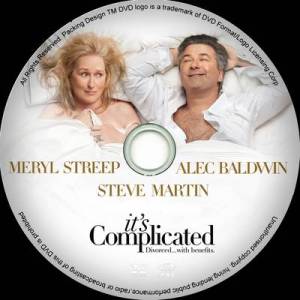On Being Latina & Lesbian in the U.S.A.:
- My published interview about “coming out” for the site New Latina.
- My essay titled “Being Cuban, One Afternoon at a Time”, which encapsulates what being Cuban means to me — featured in the Tiki Tiki Blog.
- My article “In Italics: Queer Latino Nuances in American Literature”, which discusses the psychology underlying the customary italicization of Queer Latino-American phrases in American literature. A spotlight feature in Lambda Literary.
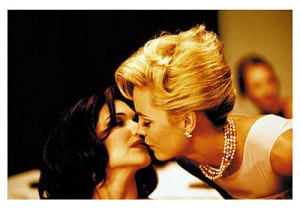
1) My published interview about “coming out” for the site New Latina:
Tracy Lopez interviews Vanessa Libertad Garcia, a filmmaker and writer living in Los Angeles, California, about lesbianism and her story on “coming out” and dealing with her sexuality as a Latina.
When did you first realize you were gay?
I’d known since I was very little, about 4 years old, that the way I felt about certain girls or women was to be kept secret because it wasn’t “the norm”. I didn’t know, however, what the label or categories were for those feelings. I didn’t know they were “lesbian” in nature. I just knew they were uncommon and could be used to ostracize me so I stuffed them down for years.
Have you “come out”?
I came out to myself and, immediately afterward, to all of my friends in the first year of college when I was 18 years old.
When you “came out” to your family, tell us what that was like. How did you feel? How did they respond?
Coming out to my family was a sort of gradual process. I came out to my immediate family such as mom and close cousins around the same time I came out to my friends. All my other family members learned about my lesbianism through the grapevine and that was that. It hasn’t been made a big deal thus far. It took my mom about a month after I first told her to get over the shock because she never expected me to come out, but even then she was sincerely supportive.
My whole family, thankfully, has been really accepting and loving. Especially my mom. There’s been no fuss made about my being a lesbian. Even my grandma, whom I recently told, took the news refreshingly well. I mean, once in a blue moon, cliche questions will pop up in conversation like, “Maybe you just haven’t met the right boy yet?” or “Why don’t you just give a man a try to be sure?” To which I always reply, “Well, maybe you just haven’t met the right girl yet?” or “Why don’t you just give a woman a try to be sure?” They usually empathize and we laugh it off.
I think it helps that my eldest aunt (on my mother’s side) came out of the closet 20 years before I did. Sadly, she had to barrel through our Cuban family’s old world homophobic disdain and rejection, but I believe her painful process ultimately humanized “the gays” in our family and paved the way for the smooth acceptance I later experienced. By the time I came out, being a lesbian in the family was old news.
I definitely felt nervous about telling my family that I was a lesbian. Nervous that they’d think I was creepy or strange… Honestly, I still don’t feel completely comfortable talking about my love life with them because, well, girls just didn’t talk about other girls like that in the Latin families I grew up around. I am more aware now than ever, however, that my uncomfortableness is just internalized homophobia flaring up and that, in fact, I have absolutely nothing to be ashamed of. Consequently, I’ll challenge myself to share with them about my lesbian lifestyle, more than I’d like to, as practice. Discussing it helps me practice embracing the naturalness, normalcy, and beauty of my homosexuality.
What problems have you faced with your family as a result?
Nothing serious so far, thank goodness.
What problems have you faced in the Latino community as a result?
None so far either. Gratefully, I’ve experienced warmth, acceptance, and support from the Latino communities I form part of — mainly film and literary.
What is your advice to other gay/bi Latinas out there who may feel alone – who maybe are younger or just haven’t come out yet?
Whether bi or gay, your sexuality is perfect. There’s nothing wrong with you. You have nothing to be ashamed of, I promise. You are not alone. There are millions like you. We are everywhere. The GLBTQ community is huge and powerful and loves you very much. We defend and stand by you. Come find us. There are Gay, Lesbian, and Transgender centers and organizations all around the world. You don’t have to hide who you are ever again. A distant Christian family member once told me, “But it’s just not natural, Vanessa. Being gay is not natural.” To which I replied, “Then why did it naturally happen to me?” We’re all Nature’s children and equal in Her eyes.
Anything else you’d like to say?
Come out of the closet and go fall in love in with some gorgeous chicas, ya lezzies Have a blast loving and being loved!
Have a blast loving and being loved!
2) My essay titled “Being Cuban, One Afternoon at a Time”, which encapsulates what being Cuban means to me — featured in the Tiki Tiki Blog.
Being Cuban. Being Woman. Being Lesbian. These are all concrete identifiable experiences for me that melt into a puddle of vagueness whenever I try to grab them and hand them over to someone else for understanding.
But, I think the best way to explain the Being Cuban part to someone not Cuban entails describing one afternoon of my life.
I was born Cuban-American a.k.a. a Cuban in the United States. Therefore, I’ve always lived at the point where two distinct worlds briefly brush against each other while on a rush to separate destinations. This dot in the space-time continuum is an unusual locale where two opposing atmospheres converge to form a rare hybrid of people: Los Cubanos-Americanos. I like to think of this planetary meeting place as my grandmother’s house.
Every Thursday from 1 p.m. – 6 p.m. for the last three years, I’ve hung out with my grandmother “Mamaita” at her home in a suburban outskirt of Los Angeles. She lives in a primarily middle-class/lower-middle class Mexican-American neighborhood. I live in a similar barrio five minutes away.
Her well-kept, peach-coated, wide 4-bedroom property faces a groomed yard adorned in pastel flowers, Aloe Vera plants, and heavy concrete ducks. During her 25 years there, she’s used the Aloe Vera to cure everyone’s everything — from derrieres wounded by poodle bites to minor burns to acne breakouts. If you really want to clear the acne for good, however, she highly recommends using Azufre three times daily.
As soon as you walk into her living room, you find yourself standing on a light-yellow shag carpet surrounded by shelves of books, family portraits, certificates of achievement, and aged trinkets from my childhood.
Her books are medical, psychological, and nutritional in nature and all in English. Although she mostly writes, speaks, and listens to the radio in Spanish, she prefers reading in English as a means of practicing the language. Her comprehension of the English language is impressively vast especially since she still struggles from time to time to wrap her mouth around the English translation of her Cuban phrases. Barack Obama becomes Arak Oama, in other words.
Our family portraits change weekly, but include us all – at one point or another – standing or sitting next to each other while looking pensively or forlornly off into the distance. Including the babies. Framed above us all, my great-grandmother, her mother, stands between two Alice In Wonderland Characters Tweedledee & Tweedledum at Disneyland, taken years back when she flew over from Cuba for a visit.
Mamaita’s certificates of achievement range from the University of Havana to college in Cali to an award she won for poetry in 1989, the Golden Poet award. A killer poet and bona fide book addict she can usually be found humming behind gold-rimmed glasses while writing with her left hand or holding a book she’s reading with her right.
When I arrive, the radio tends to blare ballads by Olga Guillot, Benny More, Celia Cruz, and Joan Baez from the “It’s a Cuban Chreeesmas” music mix I made her. Mamaita also enjoys ’60s American Folk songs and various genres of American music. One time I found her listening to Nirvana on the radio. She told me that hard stuff often helps her get the inner knots of AAH! out.
We then walk into the kitchen where she’s cooked the most delicious food I ever will eat. Hers are healthy versions of classic Cuban meals: platanitos fritos, ropa vieja, yucca, arroz prieto, y ensalada Cubana. And from behind a plastic child-protective gate, my grandmother’s heart-melting mildly obese dog “Angelita,” resemblant of a chubby little lamb, barks for me to pet her.
After petting Angelita, my grandmother and I sit down at her round 1970s dinner table. Sitting relaxed on her walker seat across from me, she cups her glamorous 1940s crop, lifts her classic gold-rimmed glasses from the tip of her nose up to her eyes, and begins gently twirling her Sagittarius necklace with her right pointer finger. Instantly, her left fist opens up and begins expressing all the ideas, memories, and feelings she’s started telling me about.
We speak about poverty in 1930s Cuba and surviving El Barrio de Jesus Maria, the positive effects vitamins and good nutrition have on the body’s different organs, and how my aunt Mamadina prayed as a little girl for La Cigüeña to bring her a little sister, and then my mom was born.
Out of the corner of my eye, I see a large Cuban coffee maker on the stove and know that after lunch we’ll drink her incomparable Cafésito Cubano con Leche de Cabra. After which she’ll recite a poem she wrote for me when I was very little and emphasize the line, “mi nietesita de ojos color caramelo.”
For me, Being Cuban means being Cuban-American one afternoon at a time.
3) My article “In Italics: Queer Latino Nuances in American Literature”, which discusses the psychology underlying the customary italicization of Queer Latino-American phrases in American literature. A spotlight feature in Lambda Literary.
Nuanced identities are amassed by an amalgam of experiences which include particular terminologies. Specific terms weave together the distinctive fabric of their unique existences.
Applying this summation to our group, the Latino-American Queers of the United States, we note that expressions such as maricon and tortillera, among many others, have poignantly shaped the dynamics of our multidimensional lives, but they require italics in American literature because they haven’t yet been accepted by the dominant White-Anglo Saxon Protestant (WASP) culture as being intrinsically “American.”
Many would argue that our Latino-American terms haven’t been adopted because they only reflect a certain minority’s experience and don’t encompass or accurately relate the wide experiential scope of the US’s cultural melting pot; neither, however, do the intricacies that comprise British, Dutch, or German customs, yet American English has adopted much of their verbiage.
Their classifications don’t require italics because American literature assumes that if you’re “American,” you understand what they mean.
“Faggot” and “dyke,” among other derogatory terms for gays and lesbians, form customary part of the American vernacular, as opposed to maricon and tortillerabecause of the particular LGBT community they reference. Descendants of the more financially and politically powerful North American colonizers, the ruling ethnic class of “White People,” comprise the list of American authors who were traditionally published from the early 1600s onward.
Notable white LGBT writers, such as Margaret Fuller and Ralph Waldo Emerson, entered the American literary scene through cautious works in the nineteenth century and were followed by a long list of more direct and outspoken queers like Walt Whitman and Gertrude Stein, etc. Their books spoke to a readership that possessed the societal clout and monetary resources necessary to successfully mass-market, mass-produce, and mass-distribute them into bookstores, educational institutions, and curricula across the country.
White people dominated the society in which they lived and considered their positive and negative nuances intrinsic to “American” culture. “Faggot” and “dyke” emerged in early 20th century American literature and language as a response to LGBT members of this powerful and well-documented ethnic community.
Even though Spanish-speaking citizens, primarily Mexican-Americans, have existed on North American soil since the white colonizers arrived and extend from California to Texas, their nuances went either undocumented or inaccurately represented by Anglo-American writers for centuries.
Classic American literature treated the Spanglish & Spanish speaking Latino-American population like an afterthought. The unique terminologies and experiences of Latino-American Queers, like all Latino-Americans before the mid-20th Century, were customarily dismissed.
They were a people pummeled into silence by poverty, lack of education, and racism as they labored on the sidelines of the mainstream America they helped build. Lost in the rubble of their struggle were the unrecorded terminologies unique to their nuanced identities such as maricon and tortillera, which are now surfacing in Latino-American literature.
1960s America brought about massive positive change for expanding the exposure and accurate documentation of minorities in the US, through a string of successful Equality-Movements such as the Civil Rights Movement, the Feminist Movement, and the LGBT Rights movement.
Post-Stonewall US saw an influx of Spanish-speakers emigrate from various South-American and Caribbean countries, from Cuba to Colombia. Many of these immigrants and/or their children turned out to be the Queer Latino Writers, who along with the already present Mexican-Americans, proactively document(ed) our once glossed-over tales. Over the last five decades, authors past and present such as John Rechy, Gloria E. Anzaldúa, Carmelita Tropicana, and Nilo Cruz have written about the American experience on behalf of Queer Latino-Americans for all Americans.
Since the 60s, there’s been a notable rise in published Latino-American Queer literature; yet, terms like maricon and tortillera continue employing italics because, although we may consider them commonplace and essential to ourAmerican stories, they have yet to be embraced by the Anglo-American ruled literary world as representative of the “central American experience.”
That being said, I don’t think we Queer Latino-American authors, who were born in or immigrated to the US, should reject italicizing our own cultural terms, even while we dislike when Anglo-American writers do it.
We should reclaim the practice of italicization in American literature and change its direction from implying that our experiences are foreign/otherthan American,toward rarely documented American norms anyone can learn more about—we must consider that we’ve only been presenting the nuances of our American experiences and their accompanying terms for the last 50 years.
We haven’t always existed in American literature like we do now. As Latino-Americans increase in number, so do the queer members of our community and the publication of their voices. When we italicize a word or phrase, we’re referencing a part of us that is often uncharted territory and merits further investigation. Italicized words can direct readers, most of which never read about us through our own eyes, to investigate the multi-dimensionality of our American norms.
The US is a diverse country with immigrants from all over the world—a myriad of ethnicities color our American Identity landscape. We can facilitate learning, deepen understanding, and broaden acceptance about our particular brand of American identity by employing the proper use of italics. If practiced in moderation and abiding by a specific set of guidelines, italicization can serve to homogenize traditionally Queer Latino-American terms (many of them Spanglish and/or Spanish in origin) into American literature.
The guideline could go as follows:
Only italicize a word or phrase which pinpoints a unique factor that differentiates our American cultural experience from others and therefore warrants further investigation—as opposed to the traditional Anglo-American use of italicization, which serves to magnify the proof of our innate otherness a.k.a. separateness from “real” Americans.
One might also want to limit italicizing a particular word or phrase to the first three timesit’s mentioned in a book: the first italic carries a footnote, which explains the term’s definition, while the other two italics repeat to reaffirm that this term is vital to the plot of the novel. The rest of the time, the term is used in the book like it’s used in our lives, without any additional attention paid to it. We just accept it as a normal part of our book’s American life and so should the reader.
The idea that any American citizen should consider and reference their American experience and its language as other is a harmful separatist notion that has no basis in reality; my life as a Cuban-American lesbian in the US may not be a common American experience, but it is, nonetheless, fundamentally an American experience.
As a writer, I navigate through my multiple identities, Cuban-American and Lesbian, by employing the use of italics. Even though I regard my multiple identities as intrinsically American, I also embrace the reality that most Americans don’t yet relate to them that way.
The Latino-American experience isn’t just as the “Hispanic” term implies: a non-specific mosh-posh of indistinguishable brown-faced Spanish-speakers—Latino-Americans are a mix of complex cultures with differing Spanish dialects and traditions. Italicizations give American readers the permission not to know how to differentiate one American sub-culture from the other and the opportunity to learn how.
For example, maricon and tortillera are general derogatory Spanish terms used throughout Latin America, but the more culturally specific machua exists in Cuban, not Mexican, vocabulary. Through italics, we can honor the nuances within our Queer Latino-American experience.
Some might argue that by italicizing our generally Spanish terms, we prevent our nuances from infiltrating mainstream American literature because many Anglo-American writers have italicized our phrases to re-enforce our otherness. I believe, however, that by reclaiming italics and employing their appropriate use, we can blend the Queer Latino-American experience and the WASP definition of “American” into a harmonious homogeny.
The contemporary American landscape is one of minority empowerment; in the last 50 years, a different type of Queer American writer has emerged to serious acknowledgement and acclaim. Queer Latino authors are sprouting up around the US and telling American tales in their own words.
If we continue to regard Queer Latino-American Identities as intrinsically “American” in our writings, we won’t always have to italicize maricon andtortillera. Over time, they’ll grow to co-exist with the terms “faggot” and “dyke.” Just as it happened for the Irish, Jews, and African-Americans, eventually many of our culturally specific terms will become commonplace within the mainstream American vernacular.
Thanks for your support & hope you enjoyed the read!
Big Hug! 🙂 V


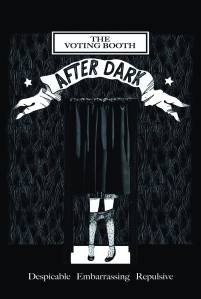

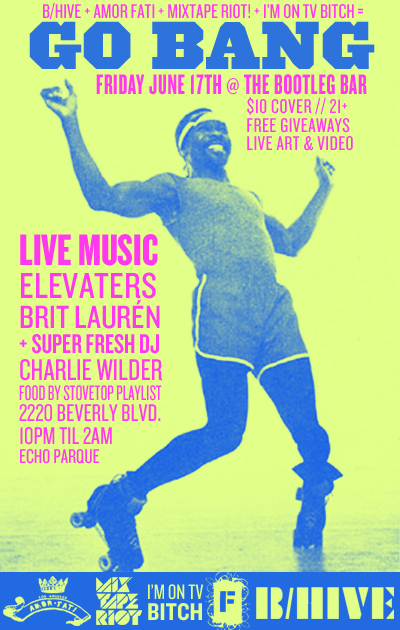
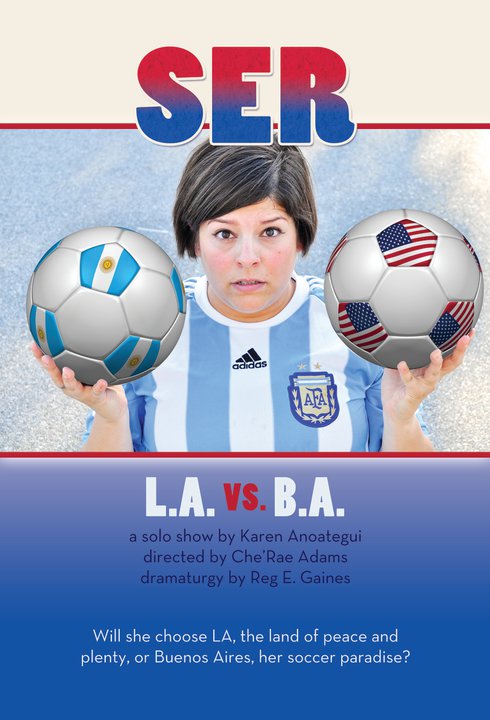



 SPC Joseph Chroniger
SPC Joseph Chroniger SSG Kevin Baker
SSG Kevin Baker

